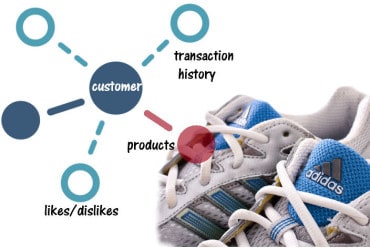
Decentralization promises to break down data systems, removing gatekeeper technologies from controlling access and reliability for these systems.
The term Single Point of Failure (SPOF) has long been used in both technology and business. In technology, it refers to a node or hub that processes all data coming and going. In business, it can mean many things, but it’s usually a point where all relevant information in a process flows to a single person, group, or organization. Regardless of context, the principle is the same: it’s where one gatekeeper controls the fate of many. And if you lose that gatekeeper, bad things happen.
Business and technology have converged in the era of big data, and that means that the leaders in content (Google), social connection (Facebook), and social communication (Twitter) have become so big and control so much in terms of information flow that they themselves are single points of failure for different arenas. Because these companies have pioneered the potential of analytics and big data for marketing purposes, they run the majority of online advertising as well as a significant share of overall traffic. This creates single points of failure, and when data breaches occur or advertising systems are abused, unscrupulous parties can have a dangerous amount of influence.
The power and risk of “big data”
When analytics were first introduced in the world of online marketing, it was a revelation. For someone like me, it seemed like the ultimate time saver — finally, we had the tools to clearly understand which areas of your marketing budget worked, as well as the ability to optimize campaigns with accurate and precisely targeted demographics. As tools became more complex, something amazing happened: marketers like myself were able to test hypotheses quickly and reasonably cheaply, then expand or revert course on what was not working.
So what happens when every interaction, purchase, or message gets loaded into an algorithm that profiles the user? The biggest tech companies — Google, Facebook, Amazon, etc. — were using artificial intelligence to process this data and predict user preferences with a stunning level of accuracy. All of this was technically legal, as terms of service essentially authorized the use of any site’s interaction to be gathered as data.
See also: 5 big data trend we’re seeing now
However, being able to predict consumer decisions even before said consumers thought of it — then put ads in front of them — was, honestly, creepy. The ethical question was never considered: should we use massive amounts of data to essentially build psychological profiles of every user in the world, then turn that info against them for targeted marketing?
The Facebook-Cambridge Analytica scandal is the realization of my own personal worst fears with technology, and it stems from a toxic combination of too much data and too much power in a single channel — in that case, Facebook. And users become apathetic and complicit in their online social engagement.
For years, the internet represented freedom to me: freedom of thought, freedom to read and explore what you wanted, freedom to express and comment on that. But with this new technology, marketers could direct thoughts before they formed through sheer volume of exposure and repetition. Studies have shown that this level of targeted advertising creates “persuasion knowledge” that influences compulsive buying or decisions.
Run-of-the-mill companies used this to get people to go to movies, buy products, or expand brand awareness. But unscrupulous entities have used this to distribute falsehoods and disinformation, and that bombardment of information has proven successful in containing viewpoints.
The trifecta of Google, Twitter, and Facebook are home to most of the web’s traffic. Because they represent the most-used channels for their particular platforms, they also represent single points of failure as technology, business, and culture converge: paths susceptible to abuse, as headlines have recently shown us. In a world where consumer opinions can be manipulated, this creates an unstable society. Given the power of these platform’s analytics and the volume of traffic involved, what can be done?
Can decentralization pull us from the brink?
It’s clear our world is at a crossroads due to the past decade’s digital revolution. From a marketing perspective, ads are run through single points of failure, all bursting out with firehose-like volume to audiences not necessarily interested in them (as evidenced by generally low conversion rates). Because there is no opt-in process to these ads, anyone can buy placement, and that’s where the problem comes in.
The goal, then, is to decentralize this process, and that means taking the power away from the ad brokers (Google, Facebook, Twitter) and going to a direct consumer-to-buyer model, totally changing the way websites earn revenue. How can that be achieved? One blockchain-based platform called the Basic Attention Token (BAT) is attempting to address this. BATs are the currency of a web browser called Brave, a natively ad-free (blocked) browser that promises to deliver much less personal data to the big media companies. Instead, individual websites participate in a user-optional program called Brave Payments, a system that “anonymously and automatically supports your favorite websites, while remaining untracked by anyone, including the Brave Software.” The process is completely inverted while removing the middleman:
Ideas like this help individuals breaks free of the clutches of the world’s biggest web companies — and thus, from a system that is highly susceptible to abuse. In a world where things are becoming more interconnected, there is an inherent danger in too much power (in web terms, traffic) is consolidated into single resources. By removing these societal single points of failure, it’s possible to sidestep the platforms that have been manipulated to maliciously influence and misinform.
Brave may not be the ultimate solution, but it’s a step in the right direction. And even if Brave isn’t around for the long haul, the basic tenants it provides are roadmap for where things need to go: freeing the public from a world where purchased information works greater than the truth.





























